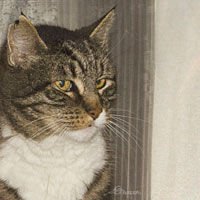Kitty Tips
Ten Mistakes Cat Owners Make
Dr. Karen Becker is a proactive and integrative wellness veterinarian who helps prevent illness in pets. This approach seeks to save you and your pet from unnecessary suffering by identifying and removing health obstacles even before disease occurs. Becker said that many cat owners don’t realize that their pets require specialized care. Here are the top 10 mistakes most cat owners make:
Using products intended for dogs on their cat: Under certain circumstances, this can prove to be a fatal mistake. Never assume any product designed for dogs is safe for cats as well. Use only products that clearly state they are safe for kitties.
Giving human medications: This, too, can prove deadly. Always consult your veterinarian before medicating your kitty. Certain medications, especially aspirin, can be fatal.
Allowing your kitty to grow obese: Over half the domesticated cats in the U.S. are overfed and under-exercised. To get your cat in shape, you can move the food bowl so it’s farther away from your cat’s normal hang out spots; get your cat to chase feather toys, ping-pong balls, or a balled up piece of wax paper; buy a remote-controlled toy mouse and get your cat to chase it around the house; or if your cat is an only cat, consider adopting another kitty for companionship as well as to keep your cat moving.
Inattention to the litter box: Cats are extremely clean creatures. They don’t like dirty, smelly litter. They also have individual preferences when it comes to types of litter and litter boxes. This can lead to litter box issues where your cat will refuse to use the litter box.
Taking a hands-off approach to your cat: It’s true kitties are independent and self-sufficient by nature, but your furry feline still needs your help with brushing or combing, nail trims, dental hygiene, and even the occasional bath.
Not taking your kitty to the vet for regular wellness checkups: Just because kitty doesn’t like to visit the vet doesn’t mean he shouldn’t. Housecats are much less likely to see a vet regularly than their canine counterparts, to the detriment of their good health. At the very least, you should take your cat in to the vet for a complete physical once a year.
Feeding dry food: Dry kibble is hands-down the worst thing you can feed your precious kitty. Most brands are devoid of exactly the kind of nourishment your cat needs to be healthy all her life. If you’re feeding your cat dry food, Becker recommends you start today to make gradual improvements in your cat’s diet.
Misinterpreting behavior changes in your kitty: Cats are stoic creatures. As a result, it can be challenging to know when your favorite feline isn’t feeling well. One thing to look for is any change in his behavior and, in particular, his litter box habits. Never assume a kitty that suddenly starts eliminating outside his box is misbehaving just to misbehave. Becker said that something about his health or his environment is causing the change, and he’s depending on you to help him sort it out.
Assuming it’s normal for your cat to throw up: It’s not normal for cats to vomit. While it’s true too many cats vomit too often, throwing up is a sign of an underlying problem that requires attention. There are reasons kitties throw up. Hairballs are just one of them. If your cat repeatedly vomits, make an appointment with your veterinarian to get things checked out.
Not brushing those tiny teeth: Dental disease is one of the most common reasons cats visit the vet, and also one of the most costly. Dental disease isn’t always confined to the mouth, either. It can lead to a host of other health problems for your furry feline. If your cat refuses brushing, you can at least get dental chews. My kitties love these http://www.amazon.com/C-E-T-Enzymatic-Hygiene-Chews-Poultry-Flavored/dp/B001P3NU58
By preventing problems in your pet before they occur, you will save time, money, and potentially the life of your kitty!
Announcements
Join CARE4Paws on Saturday, July 13, at the Pacific Pride Festival. CARE4Paws will be at Leadbetter Beach with a booth and shelter dogs for adoption. For more information, visit http://www.care4paws.org/.
Adoptable Pet of the Week

Notch is a senior citizen, a shorthaired brown-and-white tabby awaiting adoption through the Animal Shelter Assistance Program. He has light yellow green eyes, white feet, a stripey tail, and a notch on one ear that gave him his name.
Unfortunately he came from a neighborhood where all the other cats picked on him, so he’s defensive and needs to have a safe, feline-free retirement. But this boy promises to be the perfect companion. Notch is calm and sweet with people, with a gentle meow and an equally gentle spirit that craves peace and affection. And he has never met a lap he didn’t like.
The following is included in the adoption fee at ASAP: spay or neuter surgery; flea treatment; vaccinations; microchipping; health evaluation; including testing for Feline Leukemia (FeLV); and Feline Immunodeficiency Virus (FIV). Cats thought to be 10 years or older receive a full blood panel evaluation, thus assuring that the cat is indeed healthy and adoptable; medical and drug coverage through ASAP’s vet for two weeks beyond adoption, if necessary; emperament evaluation; and cat carrier (you can save the county money by bringing your own).
Animal Shelter Assistance Program (ASAP) is a volunteer-based, nonprofit organization that takes care of the cats and kittens at the Santa Barbara County Animal Shelter. ASAP provides humane care for these animals and works to eliminate the practice of euthanizing them for reasons other than serious health or behavior problems.
For more information, visit ASAP at the Santa Barbara County Animal Shelter, 5473 Overpass Road. Adoption hours are Monday-Friday, 9 a.m. to 4:45 p.m.; Saturday, 10 a.m.-4 p.m. For more information, visit www.asapcats.org or call (805) 683-3368



